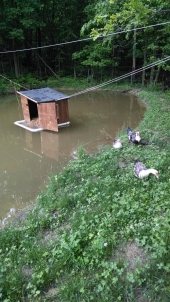Sorry the ducks left

Looks like you did a decent job building something economical for the housing.
Ours come back to their house every night. I think it has a lot to do with the fact we trained them to the house when they were young ducklings. As soon as they were out of the brooder, we started them in the house. We built a run on the house because we don't leave them loose constantly (the dogs aren't duck-friendly). They did increase their foraging area. They even found the neighbor's corn field, and went over there daily to eat the leftover field corn.
Occasionally we find them just outside of the house at night, when the weather is decent, but it's easy to herd them in. My only disappointment is that, because they aren't as reliable as the chickens about going to the shelter, we can't use an automated door.
I think the key to keeping Muscovies coming back, without clipping their wings, is to get them used to the house, give them plenty of space and bedding, and supply a perch. We also often gave them a treat of some sort when they went into the house at night, especially when they were younger. This didn't do any good once they discovered that corn field, but by that time they were always coming back at night anyway.
The next generation won't be handled as much, because of course Mama Duck will handle the babies instead of us. So I don't know yet if keeping them around will be more of a problem or not.





 2
2










































